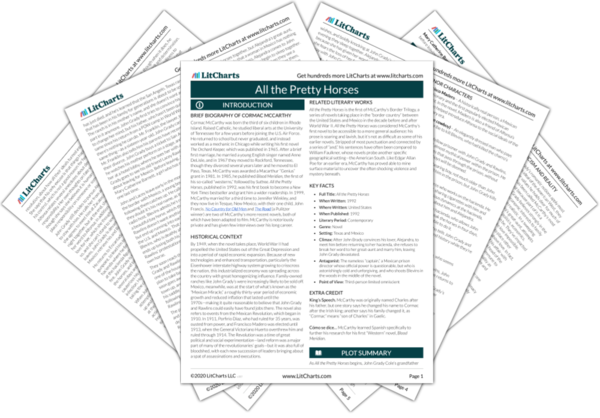Some readers might recoil at the violence of All the Pretty Horses, which ranges from graphic portrayals to bleak descriptions. Different characters take different attitudes towards violence, regarding if and when it can be justified, and how closely it may be tied to revenge and justice. As a whole, the novel seems to distinguish between different kinds of violence, but it also remains committed to portraying violent acts as a method of literary realism—showing how violence can be a part of daily life in the settings where the characters find themselves.
In some ways, the novel links violence to bravery and stoicism. In this conception, John Grady enters into a gunfight for a higher purpose: in trying to steal back the horses, he is honoring Blevins’ memory and showing his loyalty to Rawlins and his own horse. The description of his gunshot wound and the process of burning it out with a pistol shaft to avoid infection is equally violent and graphic. When John Grady tells a Texas judge his story, the entire courtroom listens to him in silent awe. John Grady himself, however, is more ambivalent about the ethics of violence. He struggles over whether he should have killed a fellow prisoner, even though it was in self-defense, and confesses to the Texas judge that he’s not a good person because he did so.
The novel is clearer about other instances of violence. The prison captain who marches Blevins into the woods to shoot him is portrayed as a monster. He is probably one of those to whom Alfonsa refers when she tells John Grady that many in Mexico live only by the law of violence—the only law they can follow and respect, the only one that means anything to them. The novel thus draws a line between violence that serves a higher purpose, and violence that is simply gratuitous, that obeys no law but itself.
Meaningful and Gratuitous Violence ThemeTracker

Meaningful and Gratuitous Violence Quotes in All the Pretty Horses
He said that war had destroyed the country and that men believe the cure for war is war as the curandero prescribes the serpent’s flesh for its bite. He spoke of his campaigns in the deserts of Mexico and he told them of horses killed under him and he said that the souls of horses mirror the souls of men more closely than men suppose and that horses also love war.

Unlock explanations and citation info for this and every other All the Pretty Horses quote.
Plus so much more...
Get LitCharts A+We can make the truth here. Or we can lose it. but when you leave here it will be too late. Too late for truth. Then you will be in the hands of other parties. Who can say what the truth will be then? At that time?
John Grady watched the small ragged figure vanish limping among the trees with his keepers. There seemed insufficient substance to him to be the object of men’s wrath. There seemed nothing about him sufficient to fuel any enterprise at all.
Yet the captain inhabited another space and it was a space of his own election and outside the common world of men. A space privileged to men of the irreclaimable act which while it contained all lesser worlds within it contained no access to them. For the terms of election were of a piece with its office and once chosen that world could not be quit.
The Mexican does not believe that a car can be good or evil. If there is evil in the car he knows that to destroy the car is to accomplish nothing. Because he knows where good and evil have their home. The anglo thinks in his rare way that the Mexican is superstitious. But who is the one? We know there are qualities to a thing. This car is green. Or it has a certain motor inside. But it cannot be tainted you see. Or a man. Even a man. There can be in a man some evil. But we dont think it is his own evil. Where did he get it? how did he come to claim it? no. Evil is a true thing in Mexico. It goes about on its own legs. Maybe some day it will come to visit you. Maybe it already has.
I never thought I’d do that.
You didnt have no choice.
I still never thought it.
He’d of done it to you.
He drew on the cigarette and blew the smoke unseen into the darkness. You dont need to try to make it right. It is what it is.
He said that those who have endured some misfortune will always be set apart but that it is just that misfortune which is their gift and which is their strength and that they must make their way back into the common enterprise of man for without they do so it cannot go forward and they themselves will wither in bitterness.
The world is quite ruthless in selecting between the dream and the reality, even where we will not. Between the wish and the thing the world lies waiting.
In history there are no control groups. There is no one to tell us what might have been. We weep over the might have been, but there is no might have been. There never was. It is supposed to be true that those who do not know history are condemned to repeat it. I dont believe knowing can save us. What is constant in history is greed and foolishness and a love of blood and this is a thing that even God—who knows all that can be known—seems powerless to change.











